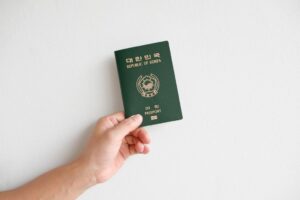In this article, we will discuss how to obtain F-2-7, F-2-99, and F-6 visas that can lead to permanent residency in South Korea.
Introduction
There are three visa types that can lead you to get a permanent residency in South Korea: F-2-7, F-2-99, and F-6. The process of obtaining each visa type will be discussed below. Please keep in mind that the following conditions apply to long-term, but still temporary, residence permit applications. Obtaining them, on the other hand, might lead to permanent residency in South Korea. Both of these visas provide you with the flexibility to change employment and start your own businesses without too many limitations because they are not based on a contract.
Obtaining an F-2-7 Visa (Long-Term Residency Point-Based Visa)
After working in the nation for one year, holders of the E-1, E-2, E-3, E-4, E-5, E-6, E-7, D-2, D-5, D-6, D-7, D-8, D-9, and D-10 visas can apply for the F-2-7 visa. The difficult aspect is meeting the conditions for obtaining this visa. The candidates are graded on a point system, with a minimum of 80 points out of a potential 120. The following are the criteria used to evaluate you:
- Age: The best age to obtain the most points is between the ages of 30 and 35. (25 points). People above the age of 51 receive the lowest rating (15 points).
- Earnings: If you earn more than 100 million KRW (85,000 USD) every year, you will receive ten points. If you earn less than 20 million KRW (17,000 USD) you will receive only one point.
- Education: The higher educational attainment you have, the higher the score you can get. A high school diploma is worth 15 points, whereas a doctorate is worth 35–33 points, depending on the program.
- Korean language proficiency: Competency is divided into six levels, which are determined by completing the Korean Language Proficiency Test (TOPIK). A candidate receives 20 points at the highest level, while the lowest level receives 10 points.
- Social integration program: The Korean Immigration and Integration Program (KIIP) is a free education program that assists expats in learning the language and adapting to the Korean way of life. It is often seen as one of the simplest methods to get additional points. The points are awarded based on the number of levels accomplished in the program. You can get up to 28 points in total. In the Education part of our guide, you’ll find more information on KIIP.
- Bonus points: You can receive an extra 1–5 points for volunteering and studying in Korea, as well as professional experience overseas. Even though it seems insignificant, every point matters, since applications that are only one point short of the minimum are rejected.
The visa has a three-year validity period.

Obtaining an F-2-99 Visa (Long-Term Residency Visa)
If you do not match the requirements for the F-2-7 visa, you may be able to obtain the F-2-99 visa. Because there is no point-based evaluation system, this visa is less stringent in terms of criteria. The duration of your stay in the nation is the most important condition:
- Holders of the D-1, D-5, D-6, D-7, D-8, D-9, E-6-1, E-6-3, F-1, and F-3 (Dependent Family Visa) visas must stay in Korea for a period of seven years or longer.
- Holders of the E-1, E-2, E-3, E-4, E-5, and E-7 visas must stay in Korea for a period of five years or longer.
You cannot leave the nation for more than a month for your stay to be considered continuous. You must also satisfy the following requirements:
- You must have a good personality (no criminal record, have sufficient income, etc).
- You must be an adult in order to participate in this activity (over 18 years of age).
- You must have above 30 million KRW in household savings (either in property or cash) (25,500 USD).
- Your previous year’s earnings must have been more than the country’s per capita GDP.
- You must have finished level 2 of the KIIP.
The validity of this visa is 1–3 years.
The F-6 marriage visa is another common option for obtaining permanent residency.
Obtaining an F-6 Visa (Korean Spouse Visa)
Please keep in mind that the following application procedure description is rather general, and the specifics may change depending on where you are from. During your initial appointment with immigration authorities, you will be taught what criteria apply to your circumstance.

Make sure you have the following paperwork (the majority of which must be given in Korean) ready for your appointment at the immigration offices:
- passport;
- a passport-sized colour picture (3.5 mm x 4.5 mm);
- Alien Registration Card (ARC);
- certificate of marriage;
- a completed visa application form;
- completed invitation form (completed by the Korean spouse);
- family registry, basic certificate, personal ID certificate (forms available online or at the immigration office that must be completed by the Korean spouse);
- tax records indicating that you and your spouse generate enough money to support your family;
- employment records demonstrating that you and your spouse make enough money to support your family;
- evidence of your marriage eligibility;
- a copy of your rental agreement for the house you and your spouse share;
- pictures of your family in your house;
- images showing you and your spouse together (to establish the relationship’s validity);
- proof that you and your Korean spouse can communicate (a record of your communications, your Test of Proficiency in Korean (TOPIK) scores, or your Korean spouse’s Test of English for International Communication (TOEIC) scores).
Some of the forms mentioned above may be acquired by phoning the immigration office and requesting a list of papers required when applying for the F-6 visa. In addition to preparing all of these papers, you will need to pay a charge for a temporary residence permit when you submit your application.
In most cases, your visa should be issued within a month. The procedure might, however, take up to six months. Your visa will be valid for one year after you receive it.
South Korea does not offer fiancé visas.
Application Process for Permanent Residency in South Korea
After you have stayed in Korea for a sufficient period of time to qualify for the F-5 visa (permanent residency visa), you can begin the application procedure for permanent residency. The needed papers vary depending on the type of visa you previously held and the type of F-5 visa you are applying for, however, you will often need to provide:
- passport;
- ARC (Alien Registration Card);
- completed application form;
- proof of income or savings (job contract, pay stubs, bank statements, and so on);
- your rental agreement;
- evidence of a clean criminal record;
- Certificate of KIIP (level 5).
- Proof of schooling, marital status, and capital may also be required.
Cost of Application for Permanent Residency in South Korea
There is no official data on how much it costs to process a permanent visa, but those who have had to go through the procedure say it should be approximately 200,000 KRW (170 USD).
Benefits of Having a Permanent Residency in South Korea
Permanent residents are allowed to:
- stay in the nation indefinitely;
- change jobs and freely explore the Korean labor market;
- They are free to start their own business;
- Go in and out of South Korea without requiring a re-entry permission;
- vote in local elections (3 years after obtaining permanent residence).
Conclusion
Obtaining permanent residency in South Korea may be difficult, and the application process may be very strict, but it is not impossible. If you want to weigh in your decisions and plan your journey well, talk to an expat advisor.
Pained by financial indecision? Want to invest with Adam?

Adam is an internationally recognised author on financial matters with over 830million answer views on Quora, a widely sold book on Amazon, and a contributor on Forbes.



